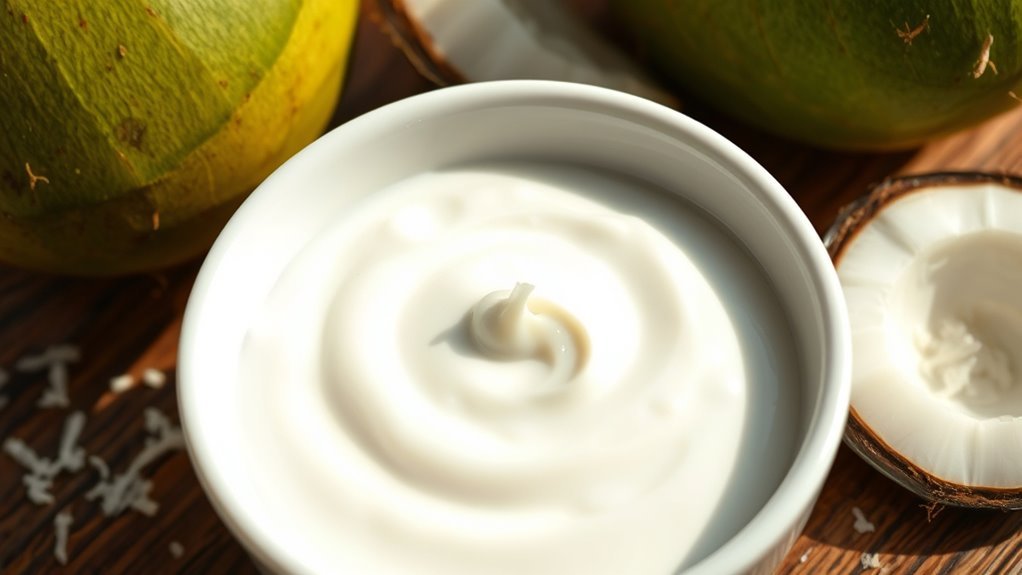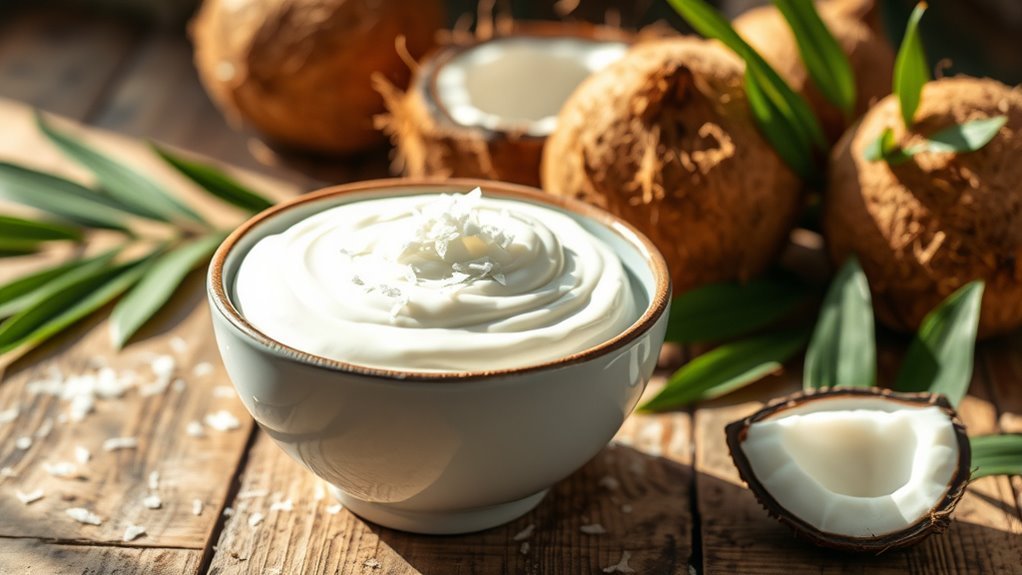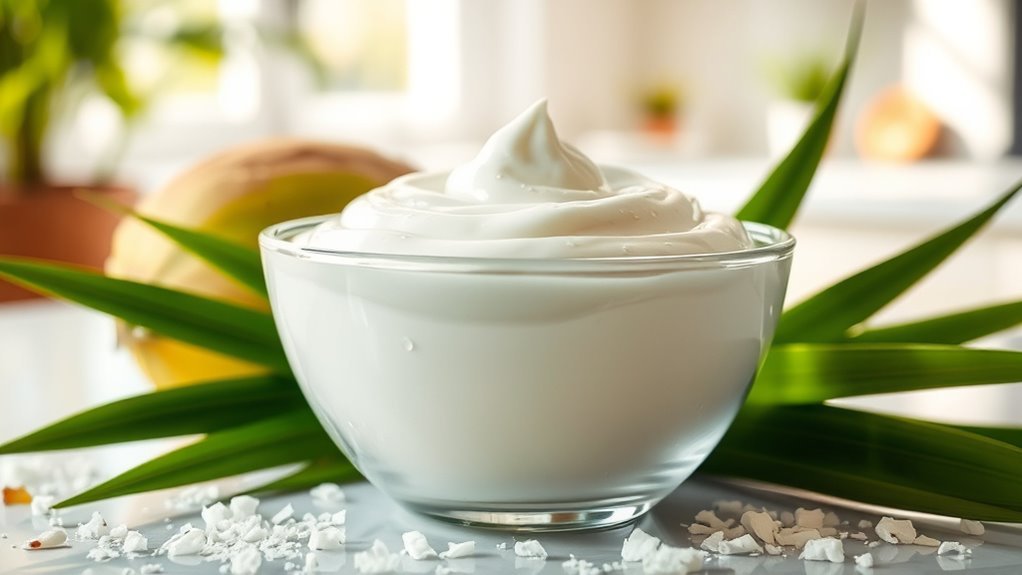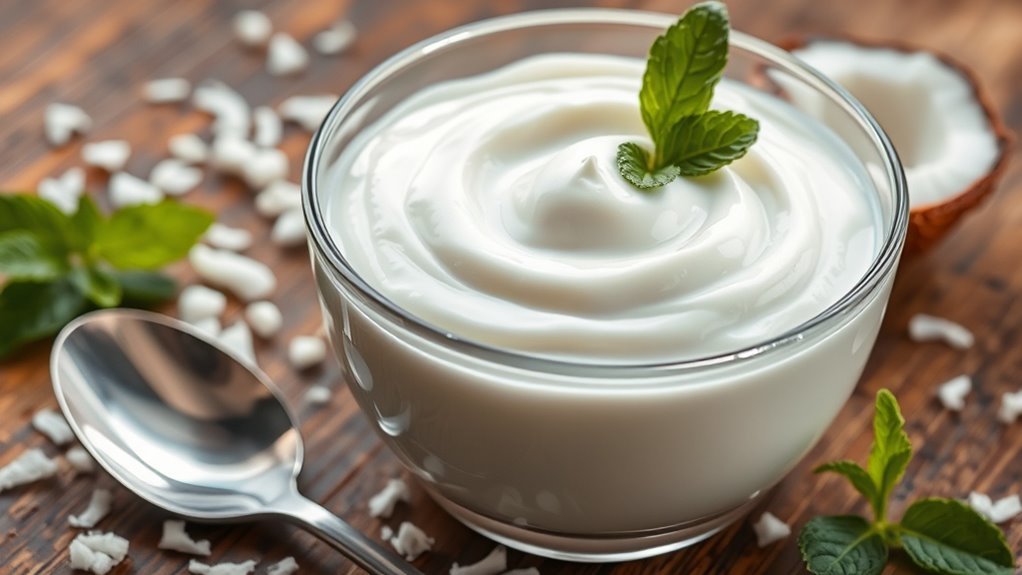Yes, coconut cream is keto-friendly. It’s high in healthy fats, especially medium-chain triglycerides (MCTs), and low in carbohydrates, making it an excellent choice for your ketogenic diet. With around 6 grams of carbs per 100 grams, it can help you meet your daily macronutrient goals. Plus, its creamy texture enhances various dishes. If you’re curious about how to incorporate it into your meals or want to know more benefits, just keep exploring!
Understanding Coconut Cream

Coconut cream, a rich and creamy product derived from the meat of mature coconuts, is a popular ingredient in many cuisines. This versatile ingredient not only adds a delightful texture but also offers several health benefits. It’s high in healthy fats, particularly medium-chain triglycerides (MCTs), which can support weight loss and improve energy levels. You might find that incorporating coconut cream into your diet can help enhance your heart health due to its potential to lower bad cholesterol levels. Additionally, it contains essential vitamins and minerals, including manganese and copper, which are crucial for various bodily functions. By choosing coconut cream, you’re adding a delicious element to your meals while reaping various nutritional rewards.
Nutritional Breakdown of Coconut Cream

When considering the nutritional profile of coconut cream, it’s essential to recognize its high fat content, which is primarily made up of saturated fats. A typical serving of coconut cream (about 2 tablespoons) contains approximately 100 calories, providing around 10 grams of total fat. Most of this fat is saturated, which can be a point of concern for some, though it’s often considered healthy in moderation. Additionally, coconut cream has minimal carbohydrates, making it suitable for low-carb diets. Its nutritional values also include small amounts of vitamins and minerals like manganese and copper. If you’re looking to incorporate coconut cream into your diet, understanding its calorie content and fat composition is vital for making informed choices.
Carbohydrate Content and Keto Compatibility

Although many people on a keto diet are concerned about carbohydrate intake, coconut cream stands out as a low-carb option. With approximately 6 grams of carbs per 100 grams, it fits well within keto guidelines. This makes it a versatile ingredient for adding richness to your meals without compromising your carb limit. Additionally, coconut cream contains around 330 calories per 100 grams, offering a satisfying source of fat. For ideal freshness, proper coconut cream storage is essential; keep it in an airtight container in the refrigerator for up to a week. You can also freeze it for longer periods, ensuring you always have this keto-friendly option on hand for your culinary creations. Enjoy the freedom of flavor without the guilt!
Benefits of Coconut Cream on a Ketogenic Diet
Incorporating coconut cream into your ketogenic diet can provide numerous benefits that enhance both flavor and nutrition. One of the key health benefits is its high fat content, which can help you meet your daily macronutrient goals while keeping you satiated. Coconut cream is rich in medium-chain triglycerides (MCTs), known to boost energy and support fat burning. Its creamy texture makes it an excellent addition to a variety of dishes, from smoothies to soups, adding a delightful tropical flavor. You can also use coconut cream in desserts, offering a low-carb alternative to traditional sweeteners. Overall, its versatility and health benefits make coconut cream a valuable asset in your culinary arsenal while following a ketogenic lifestyle.
How to Incorporate Coconut Cream Into Your Meals
Coconut cream can seamlessly enhance your meals in various ways, making it a versatile ingredient in your ketogenic diet. You can enjoy its rich flavor and creamy texture in both sweet and savory dishes. Here are some ideas to inspire you:
- Create delicious coconut cream desserts like keto-friendly panna cotta or chocolate mousse.
- Whip it into your morning coffee for a luxurious, low-carb treat.
- Use it in savory coconut recipes, like creamy curries or soups, to add depth and richness.
Incorporating coconut cream into your meals not only elevates flavors but also aligns perfectly with your keto lifestyle. Embrace this ingredient, and let your culinary creativity flourish!
Alternatives to Coconut Cream for Keto Dieters
If you’re looking for alternatives to coconut cream on a keto diet, you’ve got some great options. Heavy whipping cream offers a rich texture with low carbs, while almond milk alternatives can provide a lighter option without sacrificing flavor. Additionally, cream cheese can be used to add creaminess to your dishes, making it a versatile substitute.
Heavy Whipping Cream
Heavy whipping cream is often considered one of the best alternatives to coconut cream for those following a keto diet. With its rich texture and low-carb profile, it can elevate your dishes while keeping you aligned with your dietary goals. You’ll love experimenting with various whipping techniques to create delightful toppings and sauces. Here are a few reasons to embrace this cream variety:
- Indulge in the creamy richness without guilt.
- Enhance your recipes with a velvety texture.
- Enjoy versatility that complements both sweet and savory dishes.
Whether you’re making whipped toppings or adding it to coffee, heavy whipping cream can free you from the limitations of other alternatives. Enjoy the flavor without the carbs!
Almond Milk Alternatives
While many people turn to coconut cream for its rich flavor and creamy texture, almond milk alternatives can also be excellent options for those on a keto diet. Almond milk is low in carbs and calories, making it a great choice for maintaining ketosis. Plus, it’s packed with almond milk benefits, such as vitamin E and healthy fats. You can use almond milk in various ways, from smoothies to soups, enhancing your meals without compromising your diet. There are loads of almond milk recipes you can try, like creamy almond milk lattes or keto-friendly desserts. By incorporating almond milk into your routine, you can enjoy a delicious, versatile alternative while staying true to your keto goals.
Cream Cheese Options
When searching for alternatives to coconut cream on a keto diet, cream cheese can be a fantastic option due to its low carbohydrate content and rich, creamy texture. You’ll find several cream cheese varieties that can elevate your meals while keeping you on track.
- Classic cream cheese: Perfect for spreads or dips, it adds a delightful tang.
- Herbed cream cheese: Infused with flavors, it brings excitement to your keto friendly spreads.
- Mascarpone: A luxurious alternative, great for desserts or rich sauces.
These options not only provide versatility but also help you enjoy your meals without compromising your dietary goals. Embrace the freedom to experiment with flavors while sticking to your keto lifestyle.
Tips for Choosing the Right Coconut Cream Product
Choosing the right coconut cream product can greatly enhance your keto cooking, especially since not all brands are created equal. Start by examining the ingredients list; you want a product made primarily from coconut with no added sugars or preservatives. When choosing brands, look for those that specify “full-fat” coconut cream for the best flavor and texture. Don’t forget to check the nutritional information, ensuring the carb count fits your daily limits. Reading labels is essential; some products might contain hidden carbs or unhealthy additives. Opt for organic options when possible, as they often have fewer chemicals. With these tips, you can confidently select coconut cream that aligns with your keto lifestyle and culinary creativity.
Frequently Asked Questions
Can I Use Coconut Cream in Baking Recipes?
Absolutely, you can use coconut cream in baking recipes! It adds a rich flavor and a creamy texture that enhances your treats. If you’re looking for coconut cream substitutes, consider almond milk or cashew cream for lighter options. Just remember, the baking texture might vary slightly, so adjust your liquids accordingly. Whether you’re making cakes or cookies, coconut cream brings a delightful twist that’ll impress anyone who tries your creations!
Is Coconut Cream Dairy-Free?
Yes, coconut cream is dairy-free, making it a great alternative for those avoiding dairy. It offers numerous benefits, like healthy fats and a creamy texture, perfect for various recipes. If you’re looking for substitutes, consider almond cream or cashew cream, which also provide a rich consistency. Incorporating coconut cream can enhance your dishes while aligning with a dairy-free lifestyle, giving you the freedom to enjoy delicious flavors without compromising your dietary choices.
How Long Does Opened Coconut Cream Last?
Once you’ve opened coconut cream, it typically lasts about 5 to 10 days in the fridge. For ideal shelf life, store it in an airtight container to prevent spoilage. If you notice any off smells or changes in texture, it’s best to toss it. For longer storage, consider freezing it in ice cube trays, allowing you to use small amounts later. These storage tips can help you enjoy coconut cream without waste.
Can Coconut Cream Cause Digestive Issues?
Coconut cream can cause digestive issues for some people, especially if you have digestive sensitivity. Its high fat content might be difficult for your body to process, leading to discomfort like bloating or diarrhea. If you’re not used to consuming high-fat foods, introducing coconut cream gradually can help your digestive system adjust. Always listen to your body and consult a healthcare professional if you experience persistent problems after consuming it.
Is There a Difference Between Coconut Cream and Coconut Milk?
Think of coconut cream and coconut milk as two siblings, each with unique qualities. Coconut cream is thicker and richer, often used in desserts and curries, while coconut milk is lighter, perfect for soups and smoothies. Coconut cream uses include adding creaminess to dishes, while coconut milk benefits include hydration and essential nutrients. Understanding their differences can help you choose the right one for your culinary creations, giving you the freedom to explore diverse flavors.
Frequently Asked Questions about Coconut Cream and Keto
1. Is coconut cream keto-friendly?
Yes, coconut cream is keto-friendly! It is low in carbohydrates and high in healthy fats, making it an excellent addition to a ketogenic diet. A typical serving of coconut cream contains about 6-7 grams of carbohydrates, with the majority coming from dietary fiber, which is not counted in net carbs. This makes it a suitable choice for those following a keto lifestyle.
2. How does coconut cream fit into a keto diet?
Coconut cream can be a great ingredient in a keto diet due to its high fat content and low carbohydrate levels. It can be used in various recipes, such as smoothies, soups, and desserts. The healthy fats in coconut cream can help maintain ketosis, providing energy while keeping you full and satisfied.
3. Can you use coconut cream in keto recipes?
Absolutely! Coconut cream is incredibly versatile and can be used in numerous keto recipes. It can serve as a base for sauces, added to curries, or used in desserts like mousse and panna cotta. Just remember to check the labels for added sugars or fillers that might increase the carb content.
4. What are the nutritional benefits of coconut cream?
Coconut cream is rich in medium-chain triglycerides (MCTs), a type of fat that the body metabolizes differently than other fats, providing quick energy and potentially aiding in weight loss. It also contains essential vitamins and minerals, such as vitamin C, E, and B vitamins, along with minerals like magnesium and potassium. These nutrients support overall health while adhering to keto guidelines.
5. Are there any downsides to consuming coconut cream on a keto diet?
While coconut cream is a healthy fat source, moderation is key. It is calorie-dense, and excessive consumption could lead to unwanted weight gain if not balanced with overall caloric intake. Additionally, some individuals may experience digestive issues if they consume large amounts of coconut products. It’s advisable to introduce it gradually into your diet and consult with a healthcare professional if you have concerns.
References
- https://www.healthline.com/nutrition/coconut-cream-keto
- https://www.ncbi.nlm.nih.gov/pmc/articles/PMC6414872/
- https://www.medicalnewstoday.com/articles/323145
- https://www.sciencedirect.com/science/article/pii/S0955286317301464
- https://www.wisewell.com/blogs/blog/is-coconut-cream-keto-friendly
- https://www.cdc.gov/nutrition/index.html
- https://www.nutrition.org.uk/healthyliving/basics/fats.html
- https://www.coconutresearchcenter.org/
- https://www.webmd.com/diet/what-is-keto-diet


